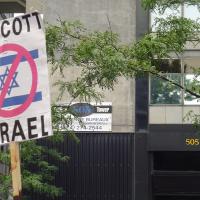Egypt Prevents Protesters from Entering Gaza
Egypt blocks about 1,300 protesters, trying to march into Gaza through the Rafah border crossing.

The protesters, from more than 40 countries, are part of the Gaza Freedom March, which was organized to protest Israel's blockade of Gaza.
Some protester, including a group of grandmothers, began a hunger strike Monday morning to protest Egypt's refusal to allow them to enter Gaza.
Rafah is the only crossing into Gaza that does not require going through Israeli territory.
Hundreds of the protesters gathered at a United Nations building asking the international agency to intercede with the Egyptian government to allow them to travel to Gaza. French protesters also caused a disturbance by camping out in front of the French embassy in Cairo and blocking the road, a major thoroughfare in the city, Jewish Telegraphic Agency reports.
It was also reported, march organizers were planning to arrive one year after Israel’s offensive in Gaza, which killed 1,400 Palestinians. The offensive was launched in retaliation for rocket attacks, and 13 Israelis also died.
The resulting blockade was meant to keep weapons from reaching militants, but activists say it has limited supplies of food and medicine in the poor, densely packed region.
March participants, who include Pulitzer Prize-winning author Alice Walker and holocaust survivor Hedy Epstein, hoped to bring attention to the issue — but Egyptian authorities have denied them permission to proceed, Sharon Wallace, another of the Louisville activists, said via phone from Cairo.
On Sunday, police briefly detained 38 participants in the Sinai town of El-Arish, according to organizers. Egyptian police also stopped some 200 protesters from renting boats on the Nile River to hold a procession to commemorate those who died in the Gaza conflict. A separate convoy of aid has been held up as well, Louisville Courier-Journal reports.
In the meantime, Gaza is under a tight Israeli and Egyptian blockade, tightened since Hamas took over the strip in 2007.
Most medicines are allowed into the territory, but their transfer can be slowed by Israeli and Palestinian bureaucracy, and the entry of medical equipment and other supplies is limited.
The World Health Organization says that at the end of November 2009, 125 of 480 essential drugs were at "zero level", meaning there was less than one month's stock left.
Israel says the military operation was - and the continuing blockade is - targeted at Hamas, not Gaza's civilians, BBC News reports.
Subscribe to Pravda.Ru Telegram channel, Facebook, RSS!


